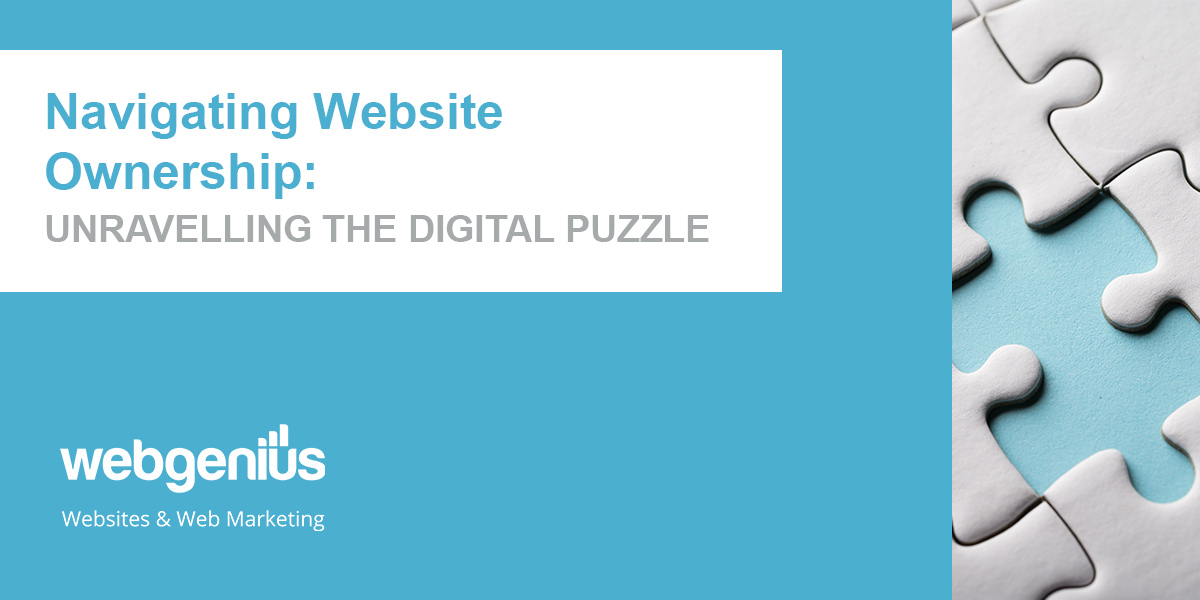Let’s embark on a journey to demystify the intricate world of website ownership. As a business owner treading the digital landscape, understanding the ownership dynamics of your website components is like having a compass for your online journey.
Let’s delve into this fascinating terrain:
Web Server: Not Yours, Usually
Think of the web server as your website’s cosy digital home. But unlike homeownership, web servers are often owned by data centres or leased through vendors. Owning one outright can be expensive, which is why leasing is a popular option.
Web Server Platform: Not Your Playground
The web server platform, akin to the operating system of your digital home, isn’t typically owned by you. It’s part of the hosting package and is managed by providers. Common examples include LAMP (Linux Apache MySql PHP), Windows IIS + ASP.NET, Microsoft SQL Server and the Web Genius software.
Content Management System (CMS): Yours, Under Certain Conditions
The CMS, your website’s trusty editor, is like a toolshed for your digital garden. Examples include the Web Genius Software, WordPress, Drupal, and Shopify. Unless you crafted the CMS yourself, ownership usually rests with its creators. Licensing comes into play here.

Database Software: Not Yours, Really
The database software storing your website’s treasures might feel like your attic, but you likely don’t own it. Common examples include MySql, Oracle and Microsoft SQL Server. Your data within it? That’s yours!
Source Code: Custom Crafting, Custom Ownership
The source code, the blueprint of your website, often belongs to the creator. However, negotiations can grant you ownership. This gets complicated with Open-Source platforms due to the GNU General Public License, which requires that any modifications that you make are also made available publicly.
HTML/CSS/Javascript: Potential Ownership Zone
These are your website’s building blocks, much like the bricks, paint, and decorations of a physical store. Ownership terms can be established, usually upon project completion and payment. Otherwise, unless you or your employees authored it, it is owned by the website creator and licensed to you.
Visual Design: Should Be Yours
Visual design, the heart of your website’s aesthetics, should ideally belong to you. The combination of layout and presentable graphical assets like colours, photography and typography to create the user interface, images and videos, and readable content of the website. The HTML/CSS/Javascript will contain the information to display these assets so the browser can render the website on your screen. An agreement upon project completion can secure this ownership. Otherwise, unless you or your employee created the designs, it is owned by the creator and licensed to you.
Text Content/Copy: Your Voice, Your Ownership
The words gracing your website belong to you. Unless stated otherwise, the content you create is your intellectual property.
Photography: Yours Through the Lens
Photography on your website is yours if you or your team captured those moments. Remember to keep track of licenses if you didn’t snap the shots yourself.
Browser: Everyone’s Friend, No Ownership
Just like you don’t own the air you breathe, you don’t own the browser you surf the web with. It’s a tool we all share. A browser will display the rendered website which includes the HTML/CSS/Javascript and all visual design assets. Examples are Chrome, Microsoft Edge, Safari, Firefox and Opera.

Domain Name: Exclusive, Not Absolute
Your Domain Name appears in the address bar of the browser. It is the humanly memorable, identifiable part of the website URL that is indexed by search engines, displayed in most marketing, and remembered as part of the brand. While you may be a registered domain owner, you don’t technically own the domain name. Instead, you have a contract with the domain registrar, granting you the exclusive right to use it.
Navigating the Legal Seas: Charting Your Course
In the realm of website ownership, the legal tides can be complex. Keep in mind that true ownership of domain names, server platforms, and CMS might elude you. However, this knowledge empowers you to make informed choices. Unless you’re coding your site from scratch, your ownership realm often covers content, visuals, and custom creations.
Remember, every piece of your website contributes to your online brand. Should you seek guidance on steering your digital ship, Web Genius is here to assist.

